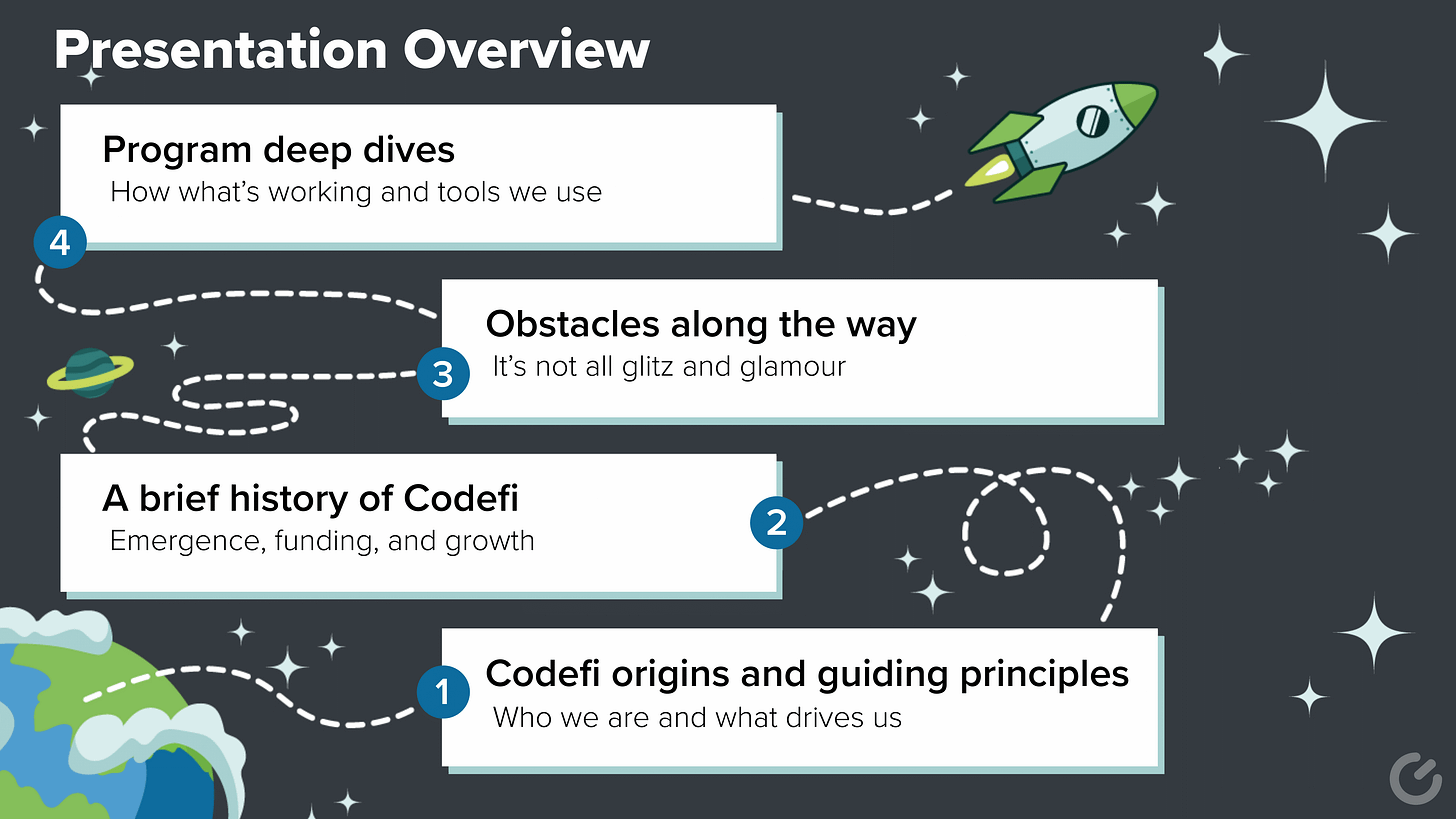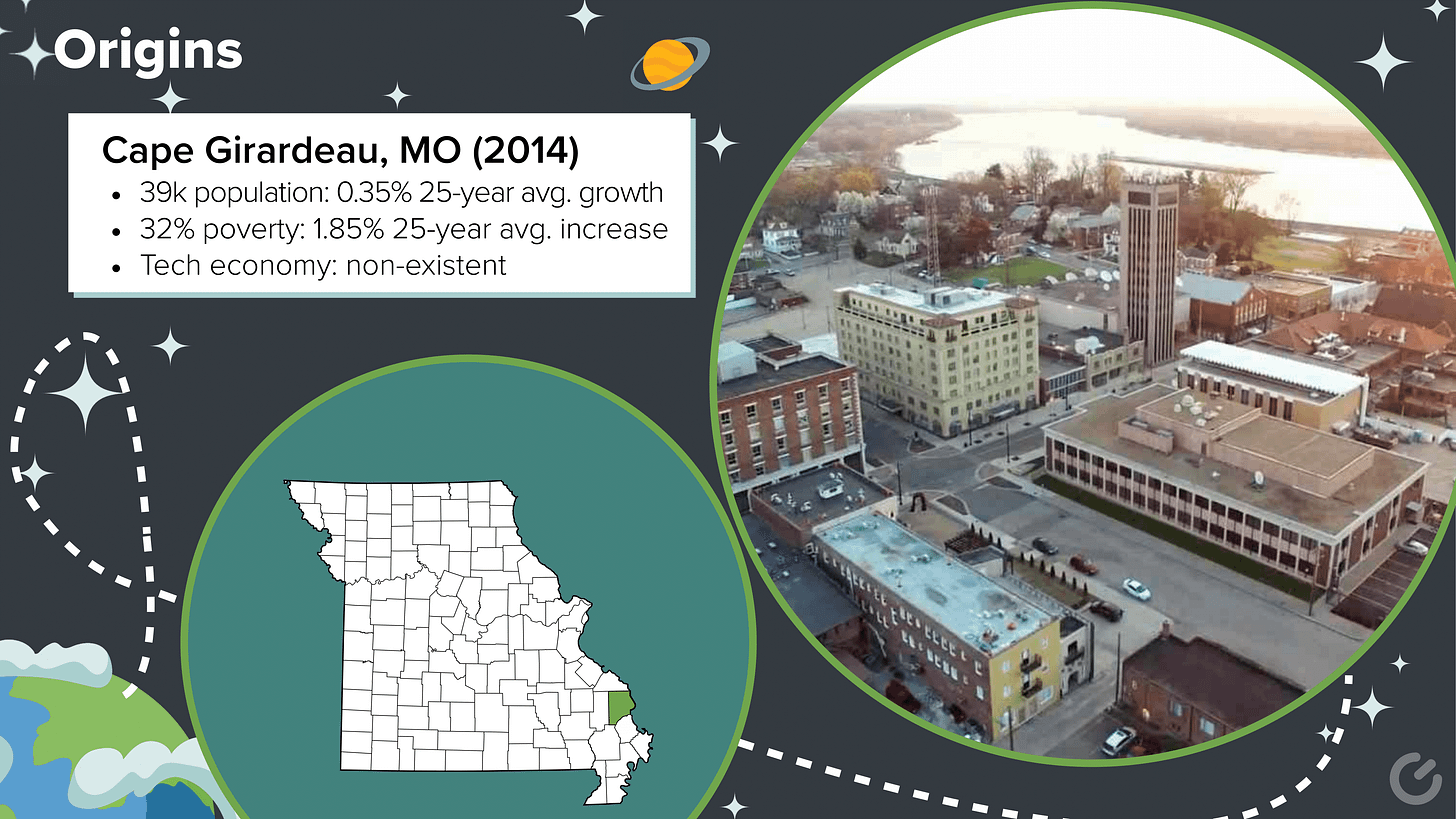An experience of regional startup and tech-based economies for small communities (Part 1 of N)
This is not a guide or framework or playbook. Some say, "we don't need or want to reinvent the wheel", but maybe we should ask those questions when the situation calls for it.
(~6 minute read)
Last week, I had the pleasure to share our story at the Center on Rural Innovation’s annual summit. This year was in Red Wing, Minnesota. What grew from 9 small towns and rural communities across the country in 2019 working towards tech-based economic development, has grown to nearly 40, and this year included the inaugural From Ideas to Impact conference that included similar people, organizations, and communities around the nation doing similar work.
A good friend, Breyana Ray, asked me to be one of the wrap-up speakers to sort of “bring it home”, where after three days of sharing ideas, knowledge, experiences, and resources, the attendees could see the potential of what that looks like when it all comes together. Humbled and honored for being the one to share about Codefi’s story; cue the imposter syndrome. Between Craig Buerstatte from the Economic Development Administration as the keynote and right before Chris Estes from the Aspen Institute as the last speaker, there wasn’t any pressure or anything…
Getting Prepped
It was also coming off the heels of a “push-it-to-the-limit” work binge. Since September of last year I’ve been putting in no less than 60 to 80-hour work weeks. It jumped up to a pretty consistent 100 in April. I just brought in three new startups to help them through the solution design portion of our startup program, which is probably one of my better skills and things I really enjoy, but is intellectually demanding.
At the same time I’m helping two other startups begin preparing to raise their first $500k seed rounds, one I agreed to create their investment deck and entire data room–some of these nascent companies you really do need to act as a co-founder. People from small towns and rural communities have mostly never been exposed to startup or tech communities and companies. The knowledge and experience gaps are significant and sometimes endless. It’s why I tell people doing similar work that you can’t wait for things to happen, because of these gaps you have to constantly be thinking how you can help to manufacture the opportunities. So I was working until 2am the week before and even during the summit with looming deadlines.
Add to it that we’re making some pretty significant structural and organization changes at Codefi. I think developing a startup or tech-based economy in a small town and rural community is no different than building a high-growth tech startup. An entire different write-up is probably worthy of the comparisons, but essentially in the early days you’re searching for the right business or ecosystem model, once you find some things that work together you begin to see if you can attract funding and support, and once you begin doing that effectively you start planning for how you can keep the momentum without necessarily needing… well… you. I’ve learned some organizations and communities do those out of order and it generally slows things down. Likewise, I’ve experienced most individuals, organizations, and communities have trouble making those very transitions.
I was telling some people recently how awhile back I had read Brad Feld’s Startup Community Way back-to-back with Reid Hoffman’s Blitzscaling. That combination sort of put into words what I may have not been able to until recently. Oftentimes, what’s needed for and by the people and organizations focused on building and growing a startup or tech-based economy very ironically directly contradicts what a tech worker or startup and founder themselves need to be successful. So how can you help both simultaneously? We do it by designing everything we do like a high-growth tech startup.
Doing the Work
Condensing 10 years worth of work down to 45 minutes when you’d like to share with others about everything you’ve done, how and why to do the very things they are trying to accomplish is an interesting exercise. I’ve spoken about our work before, but this one felt like I needed to share our experiences a little differently because of who the audience was. So I created the outline:
Codefi origins and guiding principles: who we are and what drives us
A brief history of Codefi: how we started everything we’ve done, funded those things, and have grown
Obstacles along the way: it’s not all glitz and glamor
Program deep dives: how what’s working and tools we use
I designed the slides and then crafted the presentation talking points. Once I got to practicing, I realized I was well over an hour. Honestly, I could spend hours, maybe days, diving deeper for some of the topics. Their context, subtleties, rationale, and details are so deserving as part of the story.
So, I ended up cutting down about half of my initial draft. I let everyone know that was the case and that I’d be following up with more details to hopefully provide more insight. Instead of just whipping out something quick, I thought I’d spend some time by breaking apart the presentation into manageable chunks to make it more digestible. Unless of course you want to read or hear from me for hours or days…
For anyone who has a bit more urgency and can’t wait for the long-form content to come out, please feel free to connect. Happy to share more and/or learn about what you’re doing. I don’t have all the answers, but I’m happy to help guide what we question. I’ll be following up with more long-form content to break down the presentation by providing the detail I think is so important if you’re doing, supporting, or around this sort of work. As for now, I’ll leave you with where I started this journey, both the presentation slides themselves and launching Codefi.
Origins
Circa 2014, Cape Girardeau had quite literally nothing in regards to organizations or people coming together to support startup and tech-based economic development. With an economy dominated by mostly healthcare and education, and then retail and manufacturing, it hadn’t really been on anyone’s top of mind.
It’s interesting. I’m not originally from Cape. I’m from Sikeston, about 30 minutes south in a smaller town. Growing up there, you think of Cape as the big city that has it all together. Then you grow up and start to see some truths. Unfortunately, as a regional hub, I’ve come to find out the area’s leaders had been cheering about the “greatness” of the economy and region for decades, where the economic, education, quality of life, income, etc etc. data told a very different story. And it wasn’t willful ignorance. It was strategic initiatives to keep the status quo, power, and those with influence the same.
What’s unsettling is that the “great” community had a horrendous 25-year population growth of 0.35% and the surrounding MSA that was 60% of the region’s population, had counties with sometimes double digit declines. How long until Cape succumbs to those same trends? It also had a 25-year average increase of 1.85% more people entering into poverty, where by the time we started, nearly ⅓ of the population was in poverty.
A startup and tech economy was non-existent. If we would have done a feasibility study or market analysis, any consultant or rational person would have told us we were insane for considering going down a path to creating one. But I guess to be entrepreneurial, sometimes you need to seem a little crazy at first. The rest of the series I will share more of the slides, and in the next one I’ll share with you specifically the core values and focus—both warm and fuzzy to the scientific and theoretical—that guide our work.



